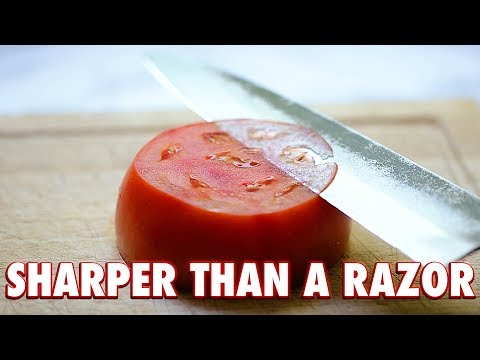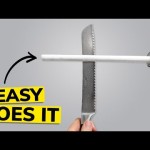
5d19d2f03c6c7b78536d0c1df49afa00
Having a sharp knife is essential for any kitchen. Whether you’re a professional chef or a home cook, having a sharp knife can make all the difference in the quality of your food. But keeping your knives sharp can be a challenge. In this article, we’ll discuss some tips and tricks for keeping your knives sharp and in top condition. We’ll cover the basics of sharpening, the different types of sharpening tools, and the best techniques for keeping your knives sharp. So read on to learn how to keep your knives sharp and in top condition.
How do I keep my knife sharp at all times
Having a sharp knife is essential for any kitchen. A sharp knife is safer to use, as it requires less force to cut through food. It also makes food preparation easier and faster. But how do you keep your knife sharp at all times? Here are some tips to help you maintain a sharp edge on your knife.
1. Use a Sharpening Stone
Using a sharpening stone is the best way to keep your knife sharp. A sharpening stone is a flat stone with a rough surface. It is used to sharpen the blade of a knife by grinding away the dull metal. Sharpening stones come in different grits, from coarse to fine. Coarse stones are used to remove large amounts of metal, while fine stones are used to refine the edge. To use a sharpening stone, you will need to lubricate it with oil or water. Then, hold the knife at a 20-degree angle and draw it across the stone in a sweeping motion. Repeat this process on both sides of the blade until it is sharp.
2. Use a Honing Steel
A honing steel is a metal rod with a handle. It is used to realign the edge of a knife blade. To use a honing steel, hold the steel in one hand and the knife in the other. Place the blade of the knife against the steel at a 20-degree angle. Then, draw the blade down the length of the steel in a sweeping motion. Repeat this process on both sides of the blade until it is sharp.
3. Store Your Knife Properly
Storing your knife properly is also important for keeping it sharp. Never store your knife in a drawer with other utensils, as this can cause the blade to become dull. Instead, store it in a knife block or on a magnetic strip. This will keep the blade from coming into contact with other objects and becoming dull.
4. Avoid Cutting Hard Objects
Finally, avoid cutting hard objects with your knife. This includes bones, frozen food, and hard vegetables. These objects can dull the blade of your knife quickly. If you need to cut these items, use a cleaver or a saw.
By following these tips, you can keep your knife sharp at all times. A sharp knife is essential for any kitchen, and it will make food preparation easier and safer. So take the time to sharpen and maintain your knife, and you will be rewarded with a sharp blade that will last for years.
How do professionals keep knives sharp
Keeping knives sharp is an important part of any professional chef’s job. A sharp knife is essential for precise and efficient cutting, and it can also help to prevent accidents in the kitchen. There are several methods that professionals use to keep their knives sharp, and each one has its own advantages and disadvantages.
Sharpening Stones
Sharpening stones are one of the most popular methods for keeping knives sharp. They come in a variety of shapes and sizes, and they can be used to sharpen both straight and serrated blades. Sharpening stones work by removing small amounts of metal from the blade, which helps to create a sharp edge. The process can be time-consuming, but it is very effective.
Electric Sharpeners
Electric sharpeners are a great option for busy professionals who don’t have time to sharpen their knives by hand. These devices use a rotating wheel to sharpen the blade, and they can be adjusted to create different levels of sharpness. Electric sharpeners are fast and easy to use, but they can be expensive and they may not be able to create as sharp an edge as a sharpening stone.
Sharpening Steel
Sharpening steel is a tool that is used to maintain the sharpness of a knife. It is a long metal rod with a handle, and it is used to hone the blade by removing small amounts of metal. Sharpening steel is a great option for professionals who want to keep their knives sharp without having to use a sharpening stone or electric sharpener. It is also relatively inexpensive and easy to use.
Conclusion
Keeping knives sharp is an important part of any professional chef’s job. There are several methods that professionals use to keep their knives sharp, including sharpening stones, electric sharpeners, and sharpening steel. Each method has its own advantages and disadvantages, so it is important to choose the one that best suits your needs.
Why is my knife not sharp after sharpening
Sharpening a knife is an important part of knife maintenance. It is essential to keep your knife sharp to ensure it is safe and effective to use. However, sometimes after sharpening, your knife may not be as sharp as you would like it to be. There are several reasons why this may be the case.
Sharpening Technique
One of the most common reasons why your knife may not be sharp after sharpening is due to the technique used. If you are using a sharpening stone, it is important to use the correct angle and pressure when sharpening. If you are using a sharpening steel, you should use a circular motion and apply even pressure. If you are not using the correct technique, it is likely that your knife will not be sharpened properly.
Sharpening Tool
Another reason why your knife may not be sharp after sharpening is due to the sharpening tool you are using. If you are using a dull sharpening tool, it is likely that your knife will not be sharpened properly. It is important to use a sharpening tool that is in good condition and is suitable for the type of knife you are sharpening.
Blade Material
The material of the blade can also affect how sharp your knife is after sharpening. If the blade is made from a softer material, it may not be able to hold an edge as well as a blade made from a harder material. It is important to choose a sharpening tool that is suitable for the type of blade you are using.
Sharpening Frequency
Finally, the frequency of sharpening can also affect how sharp your knife is after sharpening. If you are not sharpening your knife regularly, it is likely that the blade will become dull over time. It is important to sharpen your knife regularly to ensure it is always sharp and ready to use.
If your knife is not sharp after sharpening, it is important to consider the technique, tool, blade material and frequency of sharpening. By taking these factors into account, you can ensure that your knife is sharpened properly and is always ready to use.
How can I improve my knife sharpening
Sharpening a knife is an important skill to have, and it can be a great way to keep your knives in top condition. However, it can be difficult to get the perfect edge on your knife, and it can take some practice to get it right. Here are some tips to help you improve your knife sharpening skills.
Choose the Right Sharpening Tool
The first step to improving your knife sharpening skills is to choose the right sharpening tool. There are a variety of sharpening tools available, from manual sharpeners to electric sharpeners. Each type of sharpener has its own advantages and disadvantages, so it’s important to choose the one that best suits your needs. For example, manual sharpeners are often more affordable, but they require more skill and effort to use. Electric sharpeners are more expensive, but they are easier to use and can produce a sharper edge.
Understand the Sharpening Process
Once you’ve chosen the right sharpening tool, it’s important to understand the sharpening process. Sharpening a knife involves grinding away small amounts of metal from the blade to create a sharp edge. This process can be done with a variety of tools, such as a sharpening stone, a honing rod, or a sharpening steel. It’s important to understand how each tool works and how to use it properly to get the best results.
Practice, Practice, Practice
The best way to improve your knife sharpening skills is to practice. Start by sharpening a few knives and then gradually increase the number of knives you sharpen. As you practice, pay attention to the results and make adjustments as needed. With enough practice, you’ll be able to sharpen knives quickly and easily.
Keep Your Knives Clean
Finally, it’s important to keep your knives clean. A dirty knife can be difficult to sharpen, so it’s important to keep your knives clean and free of debris. Use a soft cloth to wipe down the blade after each use, and use a mild soap and water to clean the blade periodically.
By following these tips, you can improve your knife sharpening skills and keep your knives in top condition. With enough practice and patience, you’ll be able to sharpen your knives quickly and easily.
We hope these sharpening tips have been helpful in keeping your knives sharp. We wish you the best of luck in your culinary endeavors! Goodbye and take care!















